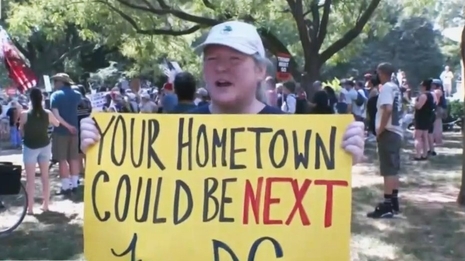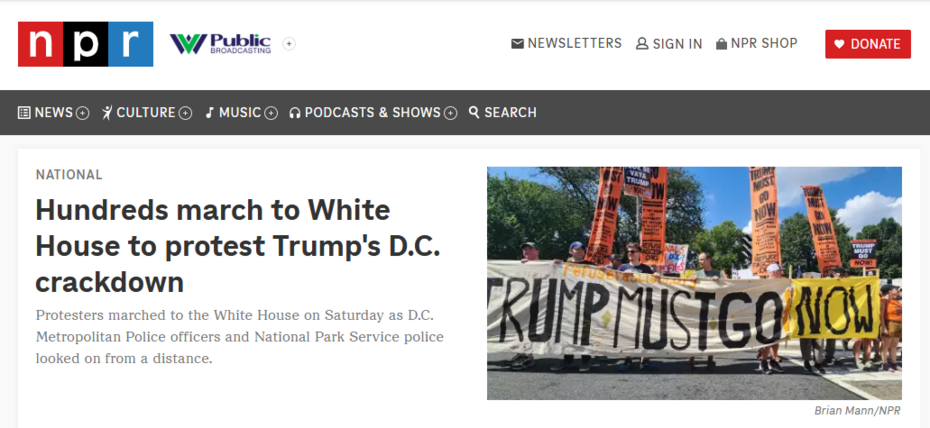 NPR’s clearly still bitter President Trump stopped their federal funding. Their home page on Sunday morning touts a small group of radical lefties: “Hundreds march to White House to protest Trump’s D.C. crackdown.”
NPR’s clearly still bitter President Trump stopped their federal funding. Their home page on Sunday morning touts a small group of radical lefties: “Hundreds march to White House to protest Trump’s D.C. crackdown.”
In other words, it’s not a large crowd, but it’s an anti-Trump crowd. We repeatedly notice NPR skips conservative protests it doesn’t like, typically the annual March for Life in January.
Brian Mann and Chandelis Duster chronicled the small radical gathering on Saturday, organized by a group calling themselves Refuse Fascism, election deniers who demand an immediate end to the “Trump Fascist Regime.”
Sam Goldman, spokesperson for Refuse Fascism, a group that helped organize the march, told NPR that it’s time for more people to make their voices heard.
“We have to turn the tide. We have to wake up all the decent people in this country, including in Washington, D.C.,” Goldman said. “Millions and millions in our bones hate everything that Trump and MAGA represent, everything they’ve done and everything they’re doing.”
Goldman also said her group is planning for more protests in D.C. in the coming weeks….
The deployment of the National Guard and Trump’s growing influence over D.C. police activities are being decried by D.C. residents — including John Smith, who said Trump is exaggerating about the city being riddled with crime.
“I think he doesn’t know what he’s talking about,” Smith said. “I’m a little old white man and I walk around safely all the time.”
Ideological labels were missing. Nothing about “leftist” or even “progressive” activists. At least NPR provided a sharp statement they received from White House press aide Abigail Jackson: “Only D.C. liberals would be upset about efforts to stop violent crime — hopefully they were paid well to beclown themselves in public like this.”

The top of the NPR home page also linked to this story from Weekend Edition Saturday: “Teenagers in Washington, D.C., say the federal police takeover makes them feel unsafe.”
Reporter Meg Anderson provided a completely one-sided story: “NPR spoke with youth in the District and the adults who work directly with them. They said it was the federal takeover that made them feel unsafe, not the crime in the District.“
MEG ANDERSON: Marek Deca is 18 years old and just arrived in D.C. earlier this month for his first year of college at Howard University.
MAREK DECA: It’s a new environment away from home, away from family. You’re already going to feel some type of way.
ANDERSON: He says he expected to feel nervous about normal freshman stuff – his classes, making friends. He did not expect to feel nervous about all these federal forces roaming the city. He said they’ve seen federal police officers patrolling near campus, and that feels unsafe.
DECA: We’re young. We want to go outside. We want to have fun in a new area, and we’re afraid to go out because we’re afraid of one wrong step, one wrong move off the crosswalk, and I’m getting flagged down for something.
ANDERSON: Deca’s fears began Monday, after the Trump administration announced plans to crack down on crime in the district, and there was a lot of emphasis on what they called young punks and roving mobs of wild youth. The reality is that D.C. did see a violent crime spike in 2023, and youth crime was part of that. But violent crime in general is now falling in the district, and youth crime is, too. Kristin Henning, who leads the Juvenile Justice Clinic at Georgetown Law, says even if the numbers were increasing, such a crackdown wasn’t necessary.
KRISTIN HENNING: We’re punishing the whole of Black youth in our city for the mistakes or misdeeds of a very, very small percentage of young people who are engaged in this type of behavior.
ANDERSON: The young people involved in D.C.’s juvenile justice system are disproportionately Black boys. She says her clinic has already gotten phone calls this week from local residents. One girl said she was put in handcuffs because she matched a description of someone else. She was eventually released.
HENNING: She called our office to say, you know, this is what they are doing to us, so that’s her perspective. Whether that officer was responding to this new executive order, it does not matter.
ANDERSON: The MPD did not respond to a request for comment. Henning says many of the young people who do commit crimes are victims of trauma. In fact, a 2022 study by the D.C. Criminal Justice Coordinating Council said as much. Research shows treating violent crime like a public health problem – addressing things like housing and food insecurity, unemployment and mental health – is effective in lowering it.
TYELA: I specifically believe it’s about the root.
ANDERSON: Tyela agrees with that research. She’s 17 and a high school senior living in one of the areas that has more violent crime than the citywide average. NPR is not using her last name because she worried about retribution from the Trump administration. She says people in her neighborhood need better mental health care, better housing and more recreational centers.
TYELA: They would not be out here, like, shooting people or M-B (ph) if they had somewhere to go.
ANDERSON: She has known people who were shot and killed.
TYELA: I’ve had multiple friends just walk outside and get shot doing things that they were supposed to be doing – like, just in the wrong place at the wrong time.
ANDERSON: She feels like Trump’s police takeover punishes all young people by making them feel like criminals and says it’s not going to solve the problem. Normally, she’d want to protest.
TYELA: But at the same time, it’s like, after all of these things going on, it’s like, how is it going to change? How is the way that I advocate for myself going to change? Am I still going to be able to do it as much?
ANDERSON: Now, she said, she’s kind of scared to. Meg Anderson, NPR News, Washington.
















